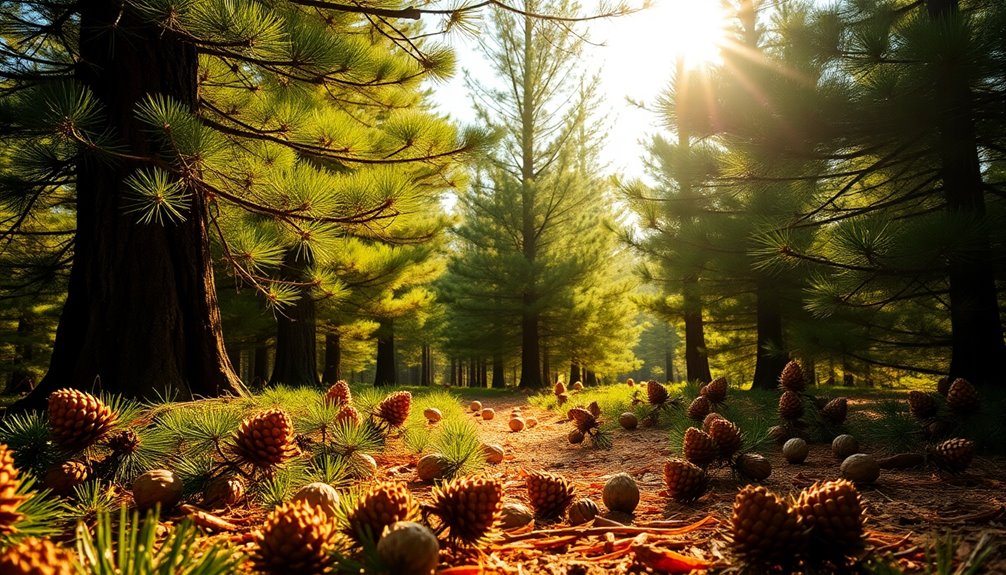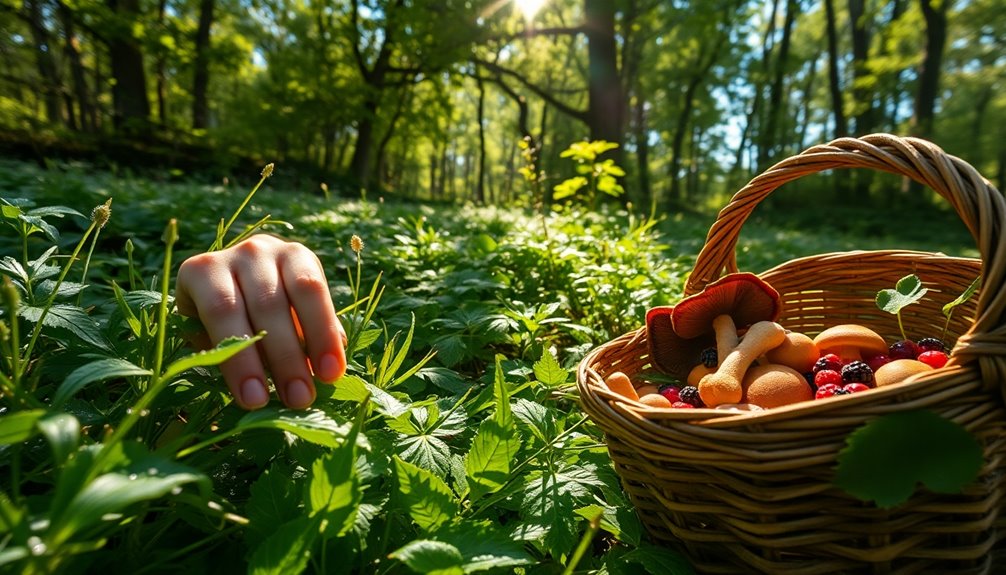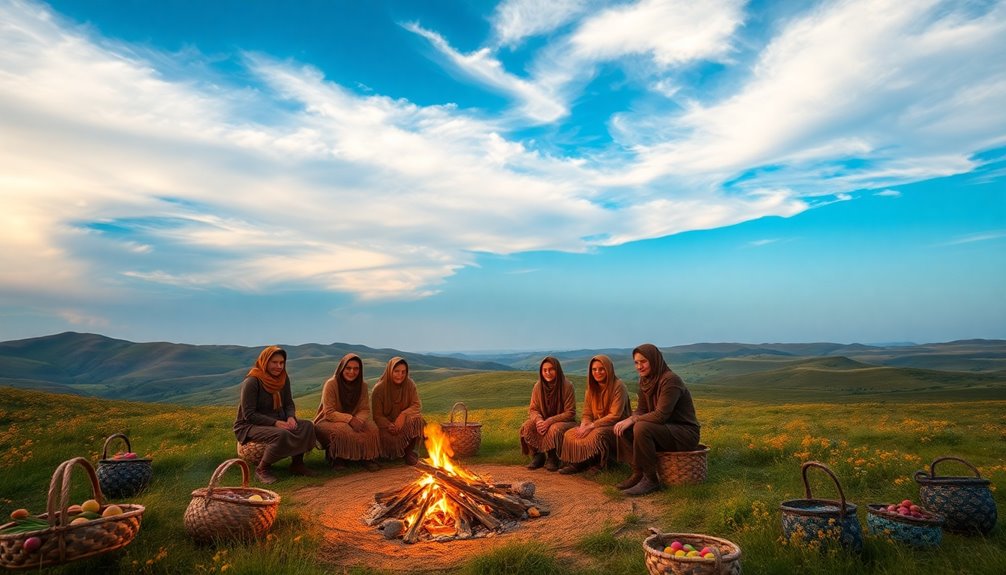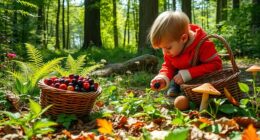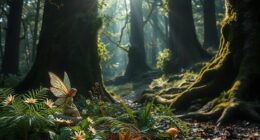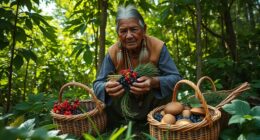You can forage across the UK, but it's essential to follow the legal guidelines to protect our natural environment. The Wildlife and Countryside Act 1981 allows personal foraging, but avoid uprooting any protected plants. Always seek permission when on private land, and steer clear of Sites of Special Scientific Interest. You'll find great foraging spots in designated open lands under the CROW Act. Remember to forage responsibly, taking only a third and ensuring proper identification of edible plants. There's a bounty of seasonal delights waiting for you, and more insights are just ahead!
Key Takeaways
- Foraging is allowed on designated open land under the CROW Act 2000, but check local bylaws for restrictions.
- Always seek permission before foraging on private property, especially for cultivated crops.
- Avoid foraging in Sites of Special Scientific Interest (SSSIs) to protect rare species and ecosystems.
- Utilize community resources, such as local foraging groups and workshops, for guidance on legal foraging spots.
- Popular foraging areas include woodlands, hedgerows, and coastal regions, but ensure proper identification and sustainability practices.
Safety Considerations for Foragers
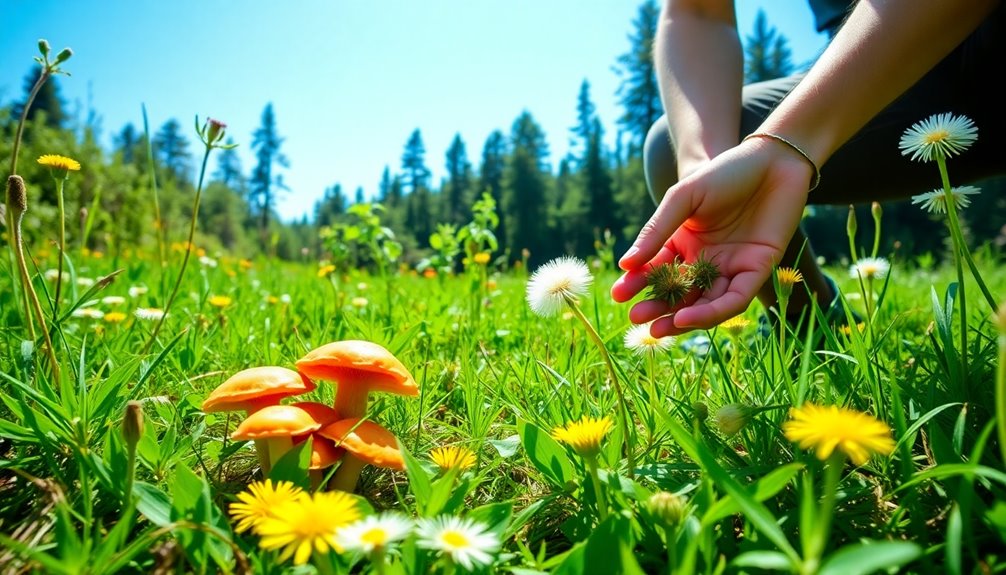
Foragers must prioritize safety when venturing into the wild. Always guarantee you can identify wild food with 100% certainty before consumption, as some plants and mushrooms can be deadly poisonous.
It's vital to familiarize yourself with local regulations regarding foraging, avoiding protected sites or areas where foraging is prohibited. Remember, you can't forage on private land without obtaining permission.
When choosing your foraging spots, seek out clean areas away from roadsides and dog walking paths to minimize contamination risks. This helps guarantee the wild food you gather is safe for personal consumption.
As a precaution, it's advisable to consume only small amounts of foraged items initially to test for any adverse reactions or toxicity.
Additionally, consider using gloves when handling certain wild plants, like nettles, to prevent skin irritation or stings.
Understanding UK Foraging Laws
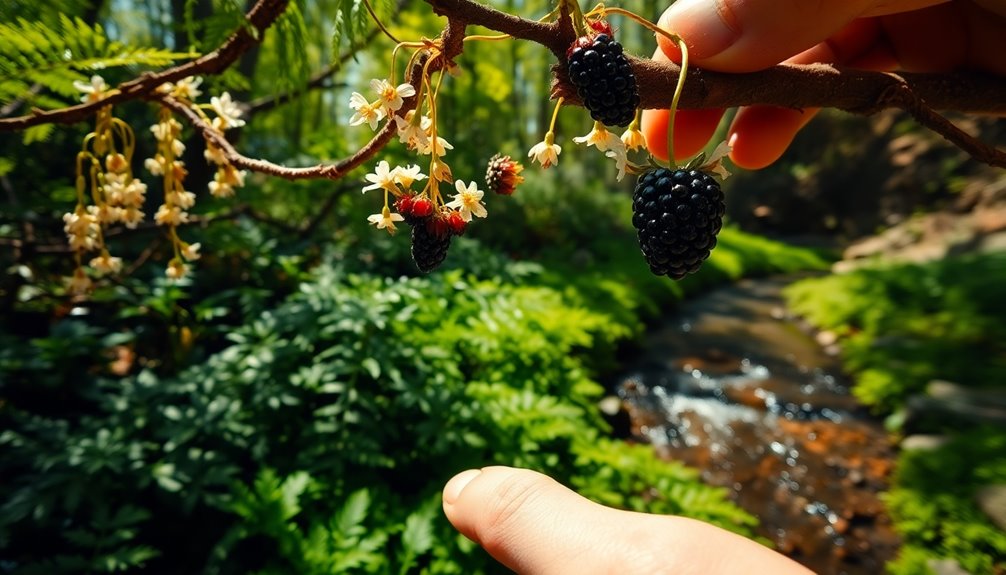
When exploring the world of foraging in the UK, it's crucial to understand the legal framework that governs this activity. Foraging for wild food can be enjoyable, but knowing the rules helps you stay within the law and protect the environment.
Here are some key points to remember:
- The Wildlife and Countryside Act 1981 allows you to collect wild food for personal use but prohibits uprooting protected plants without landowner consent.
- When foraging on private property, you need permission, especially if you're collecting cultivated crops.
- The CROW Act 2000 grants access to designated open land for recreational purposes, but local bylaws may restrict foraging activities.
It's important to respect National Nature Reserves (NNR) and Sites of Special Scientific Interest (SSSI) since these areas protect sensitive ecosystems and rare species.
Always check for access rights and seek permission when needed to make sure you're foraging legally. By understanding these laws, you can enjoy the bounty of nature while being a responsible forager.
The Countryside Act Explained
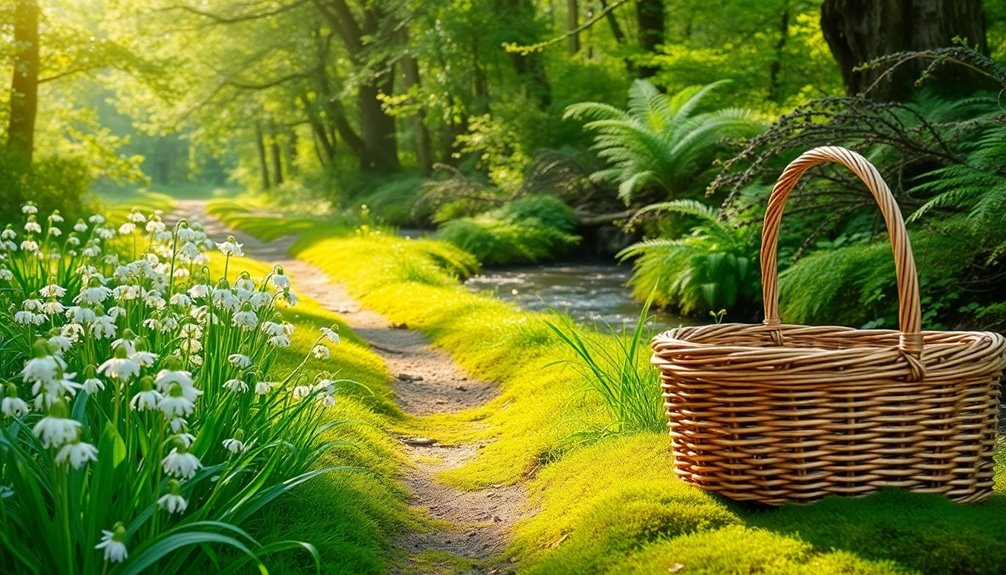
While exploring the beauty of the UK countryside, it is essential to understand the Countryside Act 1981, which lays the groundwork for responsible foraging. This legislation allows you to forage for personal consumption, specifically focusing on the "Four Fs": fruit, foliage, flora, and fungi, but only in areas with legal access.
Here's a quick overview of key points related to the Act:
| Aspect | Details |
|---|---|
| Legal Access | Foraging is allowed on common land with legal access. |
| Uprooting Prohibition | Uprooting plants without permission is prohibited. |
| Local Bylaws | Check local regulations as they may impose additional restrictions. |
| Sustainable Practices | Leave at least half of found mushrooms and plants behind. |
| Environmental Respect | Guarantee the availability of wild food resources for future generations. |
The Act emphasizes the importance of respecting the environment and local wildlife. By adhering to these guidelines, you can enjoy foraging while helping to maintain ecological balance and guarantee sustainable practices for all wild food lovers.
Foraging in Special Areas
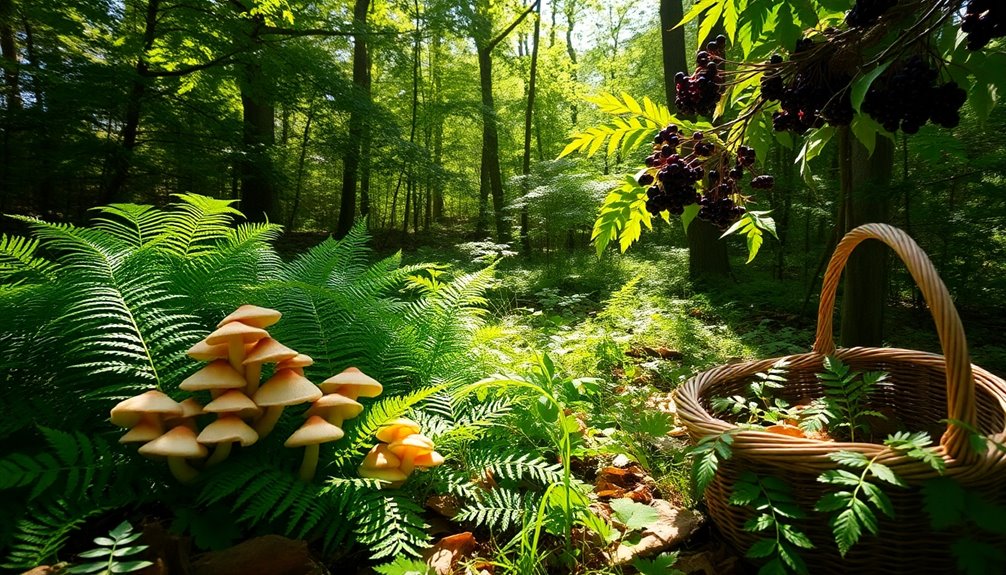
In special areas like Sites of Special Scientific Interest (SSSIs) and nature reserves, foraging is often restricted to protect delicate ecosystems and rare species. Understanding these regulations is vital for any forager looking to enjoy the bounty of the land while respecting the environment.
- Foraging is generally prohibited in SSSIs to prevent disturbance to rare species.
- Nature reserves may allow foraging, but you must adhere to specific rules under the Countryside Act.
- Always check the regulations on National Trust properties before foraging.
If you're considering foraging on private farmland, remember that you'll need explicit permission from the landowner.
Responsible foraging practices are key to preserve local biodiversity, so always respect the guidelines set in these special areas.
By doing so, you guarantee that future generations can also enjoy the wild food treasures the UK has to offer.
Staying informed about the legal aspects of foraging will help you navigate your adventures responsibly, allowing you to gather nature's offerings without harming the ecosystems you cherish.
Happy foraging!
Seasonal Foraging Opportunities
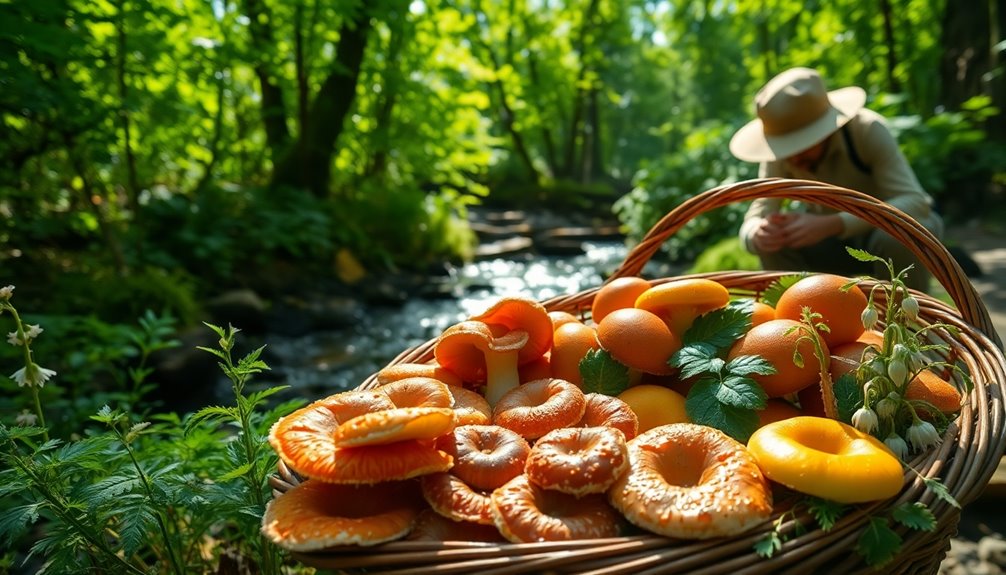
Foraging throughout the seasons in the UK reveals a diverse array of edible treasures waiting to be discovered.
In spring, you can hunt for wild garlic, with its leaves emerging in March, and dandelions, which bloom by late spring. These wild foods kick off your foraging journey.
Summer brings a bounty of elderflowers in June, perfect for making cordial, along with ripe blackberries available in August.
These ingredients make for scrumptious seasonal recipes that celebrate the flavors of the season.
As autumn rolls in, it's time to collect sloes after the first frost, which are excellent for crafting sloe gin.
You'll also find wild apples and hazelnuts, each offering unique tastes to explore.
Winter foraging offers its own delights, like edible mushrooms, particularly oyster mushrooms found on deciduous trees.
You can also gather pine nuts from mature pine trees, adding another layer to your wild food pantry. Exploring local foraging groups can enhance your experience and knowledge of seasonal finds.
Edible Plants and Uses
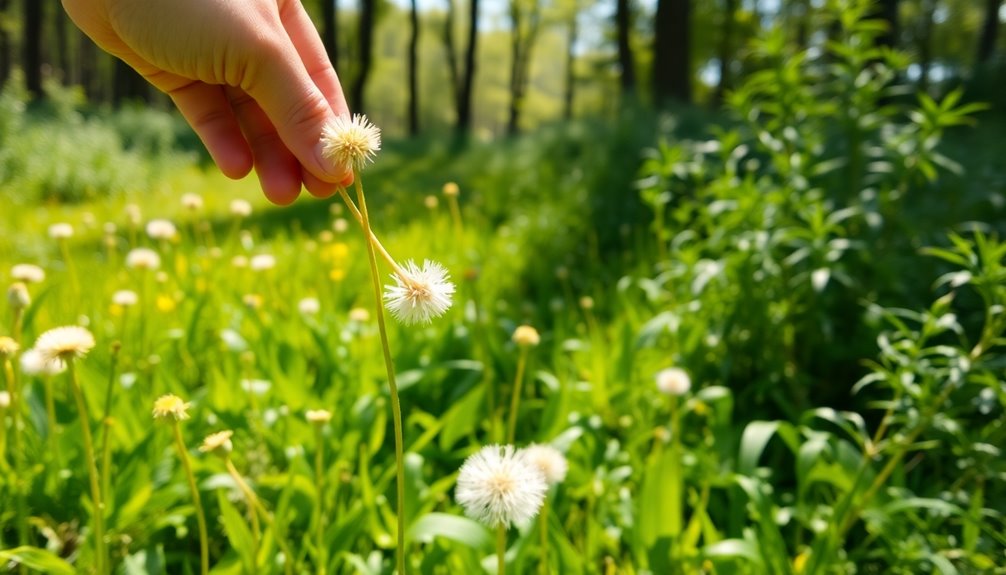
Exploring the world of edible plants in the UK opens up a treasure trove of flavors and health benefits. Foraging for wild plants not only connects you with nature but also enriches your diet with nutritious options.
Here are some fantastic edible plants you can find:
- Blackberries: Abundant in autumn, these sweet berries are perfect for pies and jams.
- Wild Garlic: Found in shaded areas, both its leaves and flowers add a distinct garlic flavor to dishes.
- Elderflowers: Blooming from late May to early July, these flowers can be transformed into invigorating cordials.
Don't forget about dandelion, whose leaves are great in salads, and roots make a delicious herbal tea.
Sweet chestnuts, harvested in late autumn, are another delightful find, ideal for roasting or incorporating into pestos.
Each of these edible plants not only enhances your meals but also supports local nature conservation efforts by encouraging foraging in legal spots.
Responsible Foraging Practices
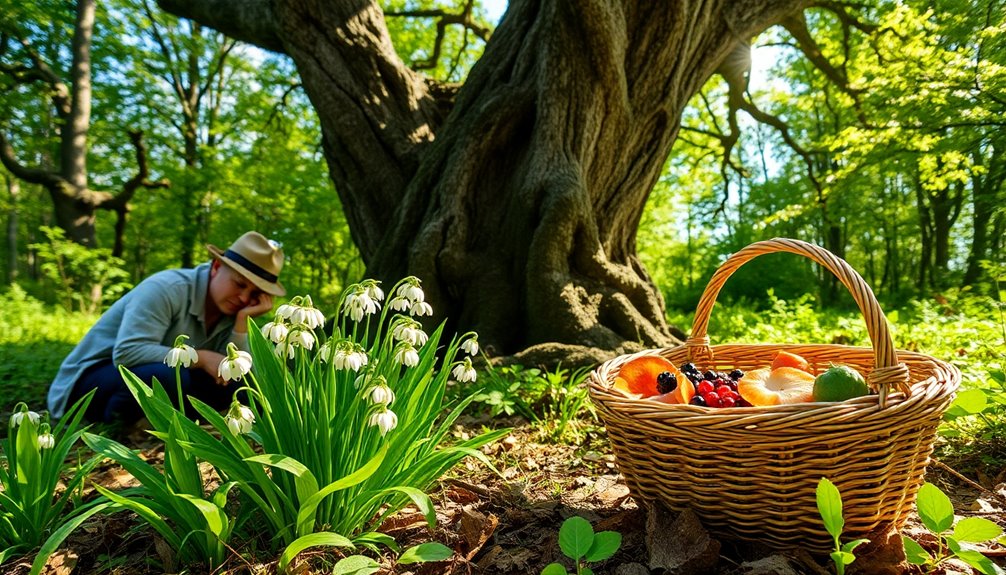
Responsible foraging practices are crucial for maintaining the delicate balance of our ecosystems. When you're foraging along public footpaths, make certain you're aware of local bylaws and regulations that might restrict your activities.
Always seek permission before foraging on private land, as collecting wild ingredients without consent is considered trespassing.
Sustainable harvesting is important for guaranteeing that plants and fungi continue to thrive. Stick to the "pick no more than half" rule, which helps maintain populations for future foragers.
As you observe the countryside, be mindful of your environmental impact. Avoid uprooting plants or disturbing wildlife habitats. It's also best to steer clear of contaminated areas, like roadsides or dog parks, to make sure you're foraging safely.
Familiarize yourself with local plant species and their seasonal availability. This knowledge will help you engage in responsible foraging practices and enjoy ethical experiences while respecting the ecosystem. Additionally, understanding the importance of community resilience can enhance your foraging experiences by connecting you with fellow enthusiasts.
By following these guidelines, you'll not only enhance your foraging adventures but also contribute to preserving the natural beauty of the UK for generations to come.
Happy foraging!
Frequently Asked Questions
Can You Forage in Parks in the UK?
You can forage in parks in the UK, but it's essential to check local regulations first.
Many city parks are private property, so you'll need to ask for permission before collecting anything. Some areas, especially conservation zones, have stricter rules.
Remember to follow the "pick no more than half" guideline to maintain sustainability.
Always research local bylaws to confirm you're respecting wildlife and habitats while enjoying your foraging adventure.
Are You Allowed to Forage in Scotland?
Foraging in Scotland's like opening a treasure chest filled with nature's bounty.
Yes, you're allowed to forage here, thanks to the Land Reform (Scotland) Act 2003. You can gather wild food from most public and private lands, but remember to tread lightly.
While foraging, avoid uprooting protected plants and check local bylaws for any specific restrictions.
Responsible foraging respects the environment, ensuring these natural treasures remain abundant for everyone.
Is It Illegal to Pick Wild Garlic in the UK?
No, it's not illegal to pick wild garlic in the UK, as it's covered by the "Four Fs" rule.
You can collect it for personal use in public areas or on private land with permission from the landowner.
Just make certain you don't uproot the plants to keep the ecosystem healthy.
Also, always ensure you correctly identify wild garlic to avoid confusing it with any harmful lookalikes.
Happy foraging!
Where Is the Best Coastal Foraging in the UK?
If you're looking for the best coastal foraging spots in the UK, head to Pembrokeshire, the Isle of Skye, or the Suffolk Coast.
During low tide, you can explore rocky shores for seaweeds like dulse and laver, or hunt for shellfish like mussels and cockles.
Don't forget to search for coastal plants like samphire, too!
Just make certain to check local regulations to guarantee you're foraging responsibly and legally.
Conclusion
In the UK, foraging offers a thrilling blend of adventure and responsibility. As you wander through lush fields and ancient woods, remember the delicate balance between enjoying nature's bounty and preserving it for future generations. By respecting the land and understanding the laws, you can savor the joy of finding wild food while nurturing the environment. Embrace the freedom of foraging, but tread lightly; every step you take can impact the wild spaces you cherish.


